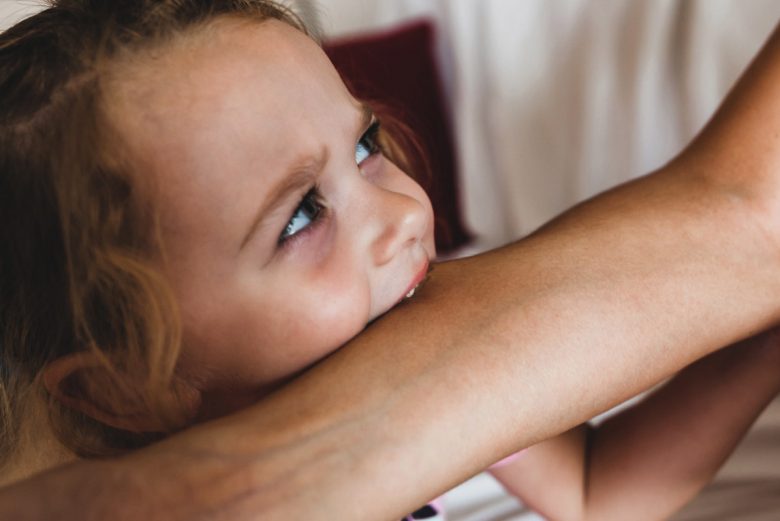
There’s something they don’t know how to tell you…
Learning appropriate physical boundaries is part of childhood development. But what do you do when a child acts physically aggressive, even after they’ve been corrected and taught over and over?
In this episode, Anne and Carol help you uncover the hidden message in your child’s aggressive behavior. It could transform your entire family.
This Episode’s Parenting Practice
If your child is presenting ongoing behavior that you can’t seem to correct, step back. Way back. Rather than focus on the child’s behavior, look at the whole situation, including family interactions, daily routines, and the Types of everyone involved. Ask for inspiration to see the larger issue. Once you see it, you have the power to influence a shift. Listen to this episode for tips.
Transcript of podcast episode
Carol: Welcome to The Child Whisperer Podcast. I’m your host, Carol Tuttle, author of the bestselling parenting book, The Child Whisperer. I’m with my co-host, Anne Tuttle Brown.
Anne: I’m seeking some guidance for how to best handle a situation with my 3-year-old Type 2 son. I’m a Type 4. In the past few months, my son has become increasingly aggressive towards my husband and myself. It started with hitting when he was mad and frustrated and morphed into digging his fingernails into our skin. He started a new preschool in the middle of June and we started noticing more aggression. We figured it was him dealing with the transition, but his teachers tell us he’s sweet and easy-going at school. I let him take his time working through his emotions when he’s melting down and give him snuggles when he’s done. This scratching needs to stop though. My arms have many scabs and scars from the last few months and my husband has also reached his limit as well.
Carol: Did they say what Type the parents are?
Anne: Yes. The mom is a Type 4 and the husband she thinks is a Type 2, with a Type 2 son. So, you know, upon reading this…
Carol: There you go.
Anne: Upon reading this question, I was like, “Oh, Type 2 physical aggression.” Like, you know, we paint the picture that oftentimes like maybe Type 3 is the one who would react that way. And so, what are we…
Carol: Right. And I think in the book, I say your Type 2 child can get very aggressive… you know, I don’t know if I use the phrase “aggressive.”
Anne: Did you see this with Chris, your Type 2 son? He was aggressive towards me as his little sister. I know that.
Carol: Yeah. I saw he was discontent in so many ways.
Anne: Yeah. And I think this is typical for Type 2. So, if that…
Carol: Right. There was stress that he was dealing with, he couldn’t put words to that he couldn’t even cognitively even know what it was, but he wasn’t getting his needs met within our family system.
Anne: So, when I mentioned the parents’ Types, why do you say, “There you go?”
Carol: Type 4 moms, without knowing it, create a construct of sort of the day-to-day experience that can feel very overbearing and very tight, very scheduled kind of. It doesn’t feel soft to a Type 2. It doesn’t feel relaxed. It feels rigid. So, if that without any reference to per se… even the snuggles, if it’s sort of this is required behavior, you know, you want to engage with your children more organically rather than time to snuggle. You know, that it’s sort of calculated. It’s just feeling-based. And so, that to me is just… see, we don’t know what you’re doing because you just do what you know true to your Type. And that’s when you can be an observer of yourself. It really helps to say, “Oh, I can see now where my Type 2 son is feeling stressed in our family system with these energies that are very much more yang and he’s yin.” And that’s here in our Lifestyle content, we teach you this yin-yang ratio within your own Type because yin is a very light, soft energy and yang is a much more push…
Anne: Rigid.
Carol: …structured, bold energy. And so, if that is what the parents’ energy, that’s going to be the feel of the household, a child’s needs are not met as readily on a subconscious level and they get anxious.
Anne: As I was kind of looking into this, I thought he’s trying to connect with you physically.
Carol: Yeah, true.
Anne: He is. It’s in a negative way, but he is reaching out, digging his fingers, and trying to connect with you in a physical way. And so, are you taking the time to connect with him physically outside of these emotional meltdowns? Does he have things that can soothe him and comfort him in a physical way? Most Type 2s do have a blanket or some, you know, stuffed animals that are their favorite. And so, giving those also Type 2s are very like, they love the feel of things. Maybe he really likes the feel of digging his fingers into your skin. I don’t know, like, they might do…
Carol: I think we talked about this other variable too of a child running the parents’ energy and I pick up on that there’s anger that this child’s processing. Like Type 2s, especially, are little empaths. And if there’s frustration issues between the parents… I mean, in the Lifestyle content, we have our Rewarding Communications course where we have our 12-video series of what it is in a couple’s experience to be married to different types. And I remember in that Type 4-Type 3 relationship combo, we call that the power couple. That’s just a really strong… two adults with very strong energies paired up that could be dealing with conflict, but not in a way that’s resolving it. And there’s this sort of unacknowledged or this stream of anger that has to be processed somewhere that this child may be the stream for because that happens.
Anne: So, what are some tips to correct that?
Carol: You need to own your energy as a parent. And you need to, when you see a child being overly aggressive rather than thinking they have that capacity to be that way, it could be something happening that’s provoking it from a dietary standpoint that needs to be corrected. It could be that it’s this misplaced energy phenomenon could be provoking it, and you need to take your stuff back, and you need to own your own energy. You need to relieve your child of being the conduit for what’s not being accounted for and resolved. Maybe there’s upsets or quarreling on a repetitive basis, but there’s some stress level that’s provoking this in the home.
The fact that there’s relief in the school experience and the child’s fine, there’s kind of an, “Ah.” So, rather than look at your child and say, “What’s wrong with my child?” Look at the bigger picture. Just say, “What’s causing the stress here that’s provoking my child to behave in a way that’s really not conducive to who they are in both age…” No child, I don’t care their Type, that level of aggression is not…
Anne: On an ongoing basis.
Carol: What’s that?
Anne: On an ongoing basis specifically.
Carol: Correct. Yeah. There’s an imbalance there that needs to be looked at. So, that can be…
Anne: So, how does a mom do that…?
Carol: Well, if it were me, I’m a prayerful person, so I would ask that it be shown to me clearly what is the cause of this rather than I’ve got to fix something in my child. I know looking… taking a step back and knowing it could be a variable of things and I’m willing to even put myself in that, in the pool of possible…
Anne: Sometimes it’s a little easier to fix, you know, when it is… sometimes, it’s a little bit of a slap in the face like, “Oh, it’s me.”
Carol: It’s okay.
Anne: Then you can do something about it.
Carol: I’m grateful I learned that early on in my mothering experience that I was willing to say, “I could be the problem.” And I’m okay with that because I didn’t expect myself to be perfect and I just knew that as I learned very early in my late 20s that it’s not just… there’s a lot of things that feed into a child’s stress.
Anne: Let’s keep this conversation going, but first we’ve got a special message for our listeners.
Woman: What’s your mom uniform? Yoga pants? Jeans and a t-shirt? As a mom, you’re busy and wardrobe isn’t high on the priority list, but do you ever get tired of feeling blah about how you look? Carol Tuttle’s Dressing Your Truth Program helps you create a personal style that works for you, for your budget, for your family, and for your life. You can look more pulled together in less time. All you need is a little know-how, and Carol can show you. Just sign up for a free account at dressingyourtruth.com.
Anne: This actually happened the other day on the Facebook page. I saw that there was a lady that was saying like, something’s going on with my son. He’s very hyperactive and you know, can have temper tantrums and such. And you pointed out, he’s running your energy and like you helped her get her Type correct. She was a Type 3, her son was a Type 1. And she was like, “That’s totally it.” She saw it for what it was. And I think that’s such a good question to ask yourself and to be more mindful rather than being like, “What is wrong with my child?” Say, “What’s going on here?” And help me to know… you know.
Carol: That this side effect is presenting in the bigger scheme of things. So, really taking that step back and going, “I’m willing to see it from many different angles and to be…” I believe a mother’s greatest tool is her inspiration and she will be guided to be shown. Speaking of, my book just launched, The Modern Chakra Guide. And I think it’s a really great read for every parent because there’s a section in there that teaches what stage of life in our childhood between birth and age 21 that these energy centers develop. And you can kind of self-reference, how am I doing with supporting my child? And what happened to me? How am I? Am I balanced? And are these energies really balanced in a healthy way that I have the benefit of them?
So, I highly recommend that book. And I just know that’s not uncommon behavior when it’s that degree, that repetitive, something’s going on that can be corrected. And I’m not the first…I’ll be one of the…I put it way down the list on, why don’t you take him to the doctor and maybe they have some diagnostic condition? Because I work in the field of energy healing. I’ve seen the power of it. I do not dismiss the medical support that we need. It has its place. I’m certainly a beneficiary of that in many, many areas of my life. But there’s so many things that are feeding into kids these days that are provoking these behaviors we hear about that it’s worth looking at that because they’re highly stimulated and they’re very sensitive to energy. Children are born very open and very much…their defenses to the energies that sort of they’re an intersection to, they don’t have many.
Anne: And The Carol Tuttle Healing Center is a great place to start when you’re ready to work on your own healing and getting in a better place.
Carol: Yeah. We have some pretty miraculous stories from parents that they’re focused on their own healing and then being able to support a child in some patterns, miraculous changes when they first just saw it as, “My child has this problem.” Well, when they joined in the bigger equation, they said, “I’m a part of all this,” things shifted dramatically. So, your parenting practice is there’s a presenting issue most likely in your family with a child, with siblings, with whatever that is showing up as, step back. Be willing to see it beyond the individual or the members of the family being the issue that they’re a byproduct of another issue in the behavior that they’re exhibiting and ask to be shown what it is. So, you can influence a shift and a correction so that child then makes a shift for the better.
Thanks for listening. For more support, go to thechildwhisperer.com where you can purchase the book, subscribe to our weekly Parenting Practice email, and find a transcription and audio of The Child Whisperer Podcast.
Anne: If you’re listening on iTunes, thank you for leaving your review. If you have a parenting question, please send it to [email protected].



